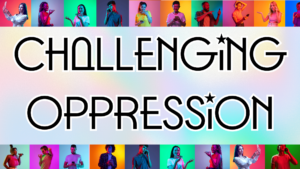There are many powerful concepts that can help us build strong and resilient communities while dismantling systemic oppression.
Mutual aid is the idea that individuals voluntarily come together to support and assist one another, sharing resources and skills to meet collective needs. Engaging in mutual aid can be as simple as helping a neighbor with groceries or participating in community projects. It fosters community resilience, empowerment, and a sense of interconnectedness beyond formal institutional support.
Radical generosity, within the context of anticapitalism, challenges the prevailing values of individual accumulation and profit maximization. It involves freely sharing resources, skills, and wealth among individuals and communities to promote equity and social justice. By rejecting the competitive and exploitative nature of capitalism, radical generosity envisions a society where cooperation, compassion, and collective well-being take precedence over self-interest and material gain.
Systemic oppression has created immense challenges for people of the global majority to build and sustain communities. Discrimination, racism, and economic exploitation have limited their access to resources and opportunities, while historical injustices like colonization and slavery have left deep structural and ongoing systemic harms that continue to impact generations. Discriminatory policies further hinder community growth and cohesion, making it challenging for marginalized communities to thrive.
Collective Action can become a force of substantial impact when individuals come together with shared purpose and intent. What may seem like modest contributions on their own, together in a coordinated fashion can help reach the collective goals. The synergy generated from pooling resources, knowledge, and efforts amplifies the effectiveness of these actions, enabling communities to address complex challenges, advocate for change, and create lasting transformation on a larger scale. The strength of collective action lies in its ability to unify diverse perspectives and individual strengths, culminating in a force that wields the potential to reshape systems, challenge inequalities, and cultivate positive social change.
Small actions can lead to BIG change!
Small individual actions, when organized and coordinated as a group, possess the remarkable ability to harness the power of collective action. By practicing selfless giving, individuals can come together, breaking down the divisions imposed by a sense of “otherness” and promote solidarity. Radical generosity promotes equity and social justice, ensuring equal access to opportunities and support. A culture of cooperation and compassion can be nurtured by creating inclusive spaces essential for community growth and cohesion. An empathetic culture not only strengthens communities but also challenges the systemic structures perpetuating oppression.
What’s in it for me?
Being part of a community network offers numerous real-world benefits. Sharing tasks and responsibilities with others not only reduces stress but also creates more free time to spend with loved ones. Collaborative problem-solving within a community provides diverse perspectives and innovative solutions. Economically, shared resources lead to cost savings and sustainable living. Networks also grant access to opportunities and connections that can enhance both personal and professional growth, enriching life overall.
Community engagement fosters a sense of belonging and connection, reducing feelings of isolation and enhancing overall well-being. Being part of an inclusive community provides a platform to share skills, knowledge, and increases self-worth as one’s contributions directly impact the lives of others. Moreover, the exchange of ideas and experiences within the community can lead to personal learning and growth, expanding perspectives and enhancing empathy. Ultimately, contributing to a diverse community enriches an individual’s life by offering a sense of purpose, connection, and the satisfaction of making a positive impact on both oneself and the larger collective.
I want to help, but where do I start?
Getting started requires two things; practice everyday acts of kindness and find and join already existing communities doing the work. Attending workshops, seminars, and events focused on topics like community building, anti-oppression, and social change can provide opportunities to learn from experts and connect with your local support systems. These experiences can deepen one’s understanding of mutual aid and radical generosity, offering practical insights on how to apply these concepts in everyday life.
Embracing mutual aid and radical generosity involves fostering a mindset of cooperation, empathy, and shared responsibility. By actively participating in community initiatives, connecting with organizations that prioritize these values, and continuously educating oneself, individuals can contribute to collective action and the creation of inclusive, resilient, and equitable communities.
One Free Community is one of many such communities, working to build a network of like minded communities to bring inclusion and accessibility to collective action and social justice movements. Learn More
About the Author
Jesenia, a collaborator with Calling Up Justice and cofounder of One Free Community, is working to build a more equitable and inclusive world by building communities. Learn more about her on NeuroSpicy Networking Website or Read Jesenia’s Bio.

